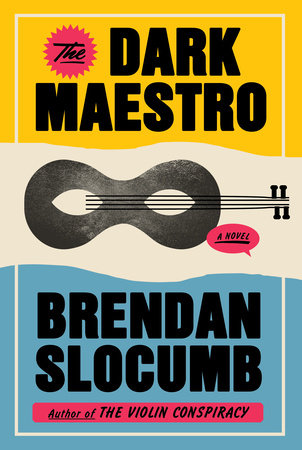Review: “The Dark Maestro” by Brendan Slocumb

Author and musician Brendan Slocumb has returned with his latest musical thriller. From the author of The Violin Conspiracy and Symphony of Secrets comes The Dark Maestro, an exciting page-turner about a young Black musical virtuoso who is forced into hiding when his family runs afoul of a ruthless criminal organization—and how he uses his love of music and comic books to fight back.
The book follows Curtis Wilson, a cello prodigy from the Southeast D.C. projects. With his mother out of the picture and his father struggling to make ends meet as a drug dealer for a powerful local gang, Curtis is all but doomed to follow a similar path. But when a music education nonprofit puts a cello in Curtis’s hands at the age of five, his life is changed forever.
Enthralled by the cello, Curtis spends every moment he can practicing—that is, when he’s not reading comic books. Music becomes a safe space amid his turbulent upbringing. Eventually, bolstered by his determination and passion, as well as the support of his music teacher and his father’s girlfriend, he rises above his challenging circumstances and lands a place at Juilliard. He is on the cusp of a major solo career when his father’s dealings with a black-market organ ring land him and his family in witness protection.
The Dark Maestro is Slocumb’s third novel to use classical music as a jumping-off point. Like Curtis, Slocumb’s life was forever altered when he was given a violin through a public school music program. Classical music opened up a world of opportunities for him, as it does for the protagonists in each of his books. (Read more about Slocumb in our interview with the author from 2023.)
Despite the similarities in set-up to The Violin Conspiracy in particular, The Dark Maestro takes a completely different turn. Whereas in The Violin Conspiracy the protagonist must chase down his stolen Stradivarius, in The Dark Maestro Curtis and his family are the ones being hunted. This latest book is quite a bit grittier than his first two offerings, reminiscent of Colson Whitehead’s Harlem Shuffle and Crook Manifesto in its depiction of a father doing his best to provide for his family while navigating a ruthless world of crime.
More so than in his previous two books, music seems a bit tangential at times in The Dark Maestro. Readers looking for a genteel book about classical music will likely be disappointed. But for readers who want a fast-paced page-turner that surprises at every turn, this is the book for them.
That said, there are some powerful descriptions of music and musical performance throughout the book as Curtis’s relationship with music changes. When Curtis is forced into hiding and loses the ability to perform for an audience, he explains how music was his way of connecting with the world. To take that away set him completely adrift, the loss exacerbated by the isolation of witness protection:
“Your music—the music that comes from your hands and your heart and your soul—will transport [the audience], will suck them up into the vortex of your sound, and they’ll come away changed. Perhaps more joyful, perhaps more thoughtful. You’ve taken them, emotionally, places they’ve never been. Places only you can take them, because those places are woven into the fabric of who you are.”
To cope with this loss, Curtis turns to his other long-held passion, comic books. He and his father’s partner, Larissa, devise a digital comic called “The Dark Maestro,” featuring a cloaked superhero cellist, to vent their frustrations and overcome their sense of helplessness. Curtis records cello arrangements of classical pieces to accompany the comics, while his father raps on top and Larissa provides the artwork. Just as performing had been a way for Curtis to connect with the world, creating the comic becomes a way for the family to heal, reconcile, and get some catharsis. It also eventually inspires them to enact vigilante justice themselves in the manner of the titular hero once all other “lawful” avenues for getting out of their situation have been exhausted.
The comic idea itself is a bit corny and acknowledged as such by the characters in the book, which undermined it somewhat, like Slocumb didn't have total confidence in the idea. Without giving too much away, it also seemed a bit unnecessary for Curtis to don his superhero alter ego’s costume in the denouement, but it did soften the extreme acts the characters were forced to take.
Just as producing the digital comic book was an act of catharsis for Curtis, so too was writing this book for Slocumb. In the author’s postscript, Slocumb relays how he was awaiting a kidney transplant while writing this book—an experience that inspired the plot point of the black-market organ ring. While all of Slocumb’s novels are personal, The Dark Maestro seems especially so, both in its invocation of Slocumb’s own passion for music and comics but also in its underlying tone of frustration and stir-craziness while the family is in witness protection. Some of that frustration makes the middle of the book a bit slow at times, but the action-packed ending becomes all the more exciting for the built up tension.
THE DARK MAESTRO | By Brendan Slocumb | Penguin Random House | 416 pp. | $29



